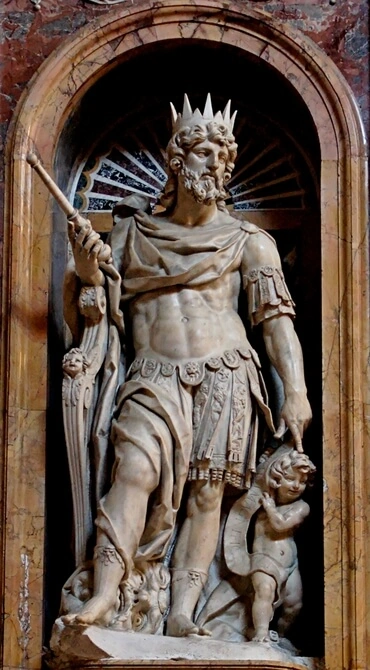1
Io vidi il Signore che stava in piedi sull’altare, e disse: "Percuoti i capitelli e siano scrollati gli architravi! Spezzali sul capo di tutti quanti, ed io ucciderò il resto con la spada! Nessun d’essi si salverà con la fuga, nessun d’essi scamperà.
2
Quand’anche penetrassero nel soggiorno dei morti, la mia mano li strapperà di là; quand’anche salissero in cielo, di là io li trarrò giù.
3
Quand’anche si nascondessero in vetta al Carmelo, io li scoverò colà e li prenderò; quand’anche s’occultassero al mio sguardo in fondo al mare, là comanderò al serpente di morderli,
4
e quand’anche andassero in cattività davanti ai loro nemici, là comanderò alla spada di ucciderli; io fisserò su di essi i miei occhi per il loro male, e non per il loro bene.
5
Il Signore, l’Iddio degli eserciti, è quegli che tocca la terra, ed essa si strugge, e tutti i suoi abitanti fanno cordoglio; essa si solleva tutta quanta come il fiume, e s’abbassa come il fiume d’Egitto.
6
Egli è colui che costruisce nei cieli le sue stanze superiori, e ha fondato la sua vòlta sulla terra; egli chiama le acque del mare, e le spande sulla faccia della terra; il suo nome è l’Eterno.
7
Non siete voi per me come i figliuoli degli Etiopi, o figliuoli d’Israele? dice l’Eterno. Non trassi io Israele fuori dal paese d’Egitto, e i Filistei da Caftor, e i Siri da Kir?
8
Ecco, gli occhi del Signore, dell’Eterno, stanno sul regno peccatore, e io lo distruggerò di sulla faccia della terra; nondimeno, io non distruggerò del tutto la casa di Giacobbe, dice l’Eterno.
9
Poiché, ecco, io darò l’ordine, e scuoterò la casa d’Israele fra tutte le nazioni, come si fa col vaglio; e non cadrà un granello in terra.
10
Tutti i peccatori del mio popolo morranno per la spada; essi, che dicono: "Il male non giungerà fino a noi, e non ci toccherà".
11
In quel giorno, io rialzerò la capanna di Davide ch’è caduta, ne riparerò le rotture, ne rileverò le rovine, la ricostruirò com’era ai giorni antichi,
12
affinché possegga il resto d’Edom e tutte le nazioni sulle quali è invocato il mio nome, dice l’Eterno che farà questo.
13
Ecco, i giorni vengono, dice l’Eterno, quando l’aratore raggiungerà il mietitore, e il pigiator dell’uva colui che sparge il seme; quando i monti stilleranno mosto e tutti i colli si struggeranno.
14
E io trarrò dalla cattività il mio popolo d’Israele; ed essi riedificheranno le città desolate, e le abiteranno; pianteranno vigne, e ne berranno il vino; faranno giardini, e ne mangeranno i frutti.
15
Io li pianterò sul loro suolo, e non saranno mai più divelti dal suolo che io ho dato loro, dice l’Eterno, il tuo Dio.







